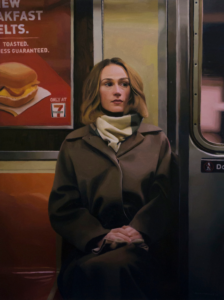
Ben Davis of artnet news reports a story that sounds all-too-familiar these days:
A little more than a week ago, I wrote a review of an art show by the artist and TikTok sensation Devon Rodriguez, best known for live drawing subway riders. He is, by some measures, the most famous artist in the world, with many millions of social media followers. He did not like the review.
It went up on a Friday. On Saturday morning, I woke up to a tidal wave of anger from Rodriguez on Instagram, tagging me across scores of posts. Hundreds of his followers went on the attack.
Davis gives a more nuanced and thoughtful analysis of his hellish situation than should be expected from someone who received death threats over, of all things, a review of an art show. He reasons
the only way I can understand Rodriguez’s incredibly thin-skinned reaction to my article is that he has managed to rise to this status of apex visibility without any kind of critical writing about him at all. It’s all just been feel-good profiles, so that the first critical word feels like a huge crisis. That’s a relatively new kind of situation for an artist to be in…
In the past, artists had to pass through the gatekeepers of museums and art galleries before becoming well-known to the public. Even Basquiat had to break through the establishment before securing his place in the art world. In today’s digital world, it’s possible, even desirable, to hurdle over the gatekeepers and go straight to the masses with one’s output.
A similar dynamic is at play in the world of publishing, as I’ve written about a few times. This desire to stand above criticism is, in my mind, the root motivation for dysfunctional narratives. The tenor of the attacks Ben Davis withstood sounds much like the way dysfunctional narratives are defended, such as the Rodriguez fan who snapped at Davis, “What if he was your son??”
Davis links this reaction to the notion of “parasocial relationships,” that is, “the imaginary, one-sided friendships people develop with celebrities and influencers in their heads.” This cuts to the “transitive logic” I wrote in 2019 about an all-too-similar event involving Sarah Dessen and her followers when they attacked a college student who posted a relatively innocuous criticism of Dessen’s work: “The logic magnified an innocuous criticism of a single YA author to an attack on all YA fiction and its readers. Thus, the logic went, if you’re a reader of YA fiction, it’s a personal attack on you.”
“Parasocial relationships” is the best term I’ve seen to describe how Dessen’s followers rose up and hounded the college student offline. Much of the outrage seemed rooted in the feeling that Dessen was not merely a YA author, but their friend. Any why not? These new, online super-authors are
not merely authors, they’re brands. Many of these YA authors have crafted an online persona of a confidant and sympathizing mentor. You don’t merely read their books, you hear from them everyday. You see their vacation photos and learn about their pets. You share their ups and downs in the real world.
Wikipedia says that the term parasocial interactions was first coined in 1956, no doubt in part inspired by the rise of television in the United States. The researchers described them existing prior to mass media, such as people emotionally bonding to gods, supernatural spirits, or saints. They are telling examples.
It requires no divination skills to predict these social media brouhahas will continue so long as artists and writers can organically grow their followings. Certainly I don’t see these kerfuffles as justification for returning to the pre-digital way, where editors and publishers decided over Negroni lunches who got published and who got to languish. But being thin-skinned to criticism, and using one’s followers to “cancel” the critic, is a bad choice no matter how you look at it.
As Davis predicts:
If there’s no criticism of [Rodriguez’s art], here’s what I think will happen: All the marketing companies and PR people looking to piggyback on Rodriguez’s popularity will stuff his feed with more and more cringe celebrity content and half-baked promo ideas until his social-media presence is bled dry of whatever charm it has.
